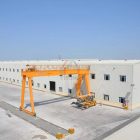What kind of insulation board to choose for steel frame workshop?
When it comes to selecting insulation panels for a steel frame workshop, there are several factors to consider. Insulation plays a crucial role in maintaining a comfortable and energy-efficient working environment, so choosing the right type of insulation is essential. This article will discuss the different types of insulation boards available and help you make an informed decision.
Firstly, it’s important to understand the purpose of insulation in a steel framework workshop. Insulation helps regulate the temperature inside the building by preventing heat transfer between the interior and exterior. It also aids in reducing noise transmission and condensation buildup. Therefore, the chosen insulation panels should effectively address these concerns.
One popular choice for insulation board is expanded polystyrene (EPS). EPS panels are lightweight, easy to install, and offer excellent thermal insulation properties. They are resistant to moisture, making them ideal for areas with high humidity levels. EPS panels also have good sound absorption qualities, minimizing noise transmission within the workshop. Additionally, EPS is an affordable option, making it a popular choice for many steel frame workshops.
Another option to consider is polyurethane (PUR) insulation panels. PUR panels provide excellent thermal insulation and are known for their high energy efficiency. They have a closed-cell structure, which prevents moisture absorption and reduces the risk of condensation. PUR panels are also lightweight and easy to handle during installation. However, they tend to be more expensive compared to EPS panels.

Rock wool insulation panels are also commonly used in steel framework workshops. Made from natural or synthetic mineral fibers, these panels offer excellent thermal and acoustic insulation properties. Rock wool panels are resistant to fire, making them a safe choice for workshops. They are also non-combustible and do not release toxic gases when exposed to high temperatures. However, rock wool panels can be more costly than EPS or PUR panels.
When selecting insulation board, it’s crucial to consider the R-value. The R-value is a measure of thermal resistance, indicating how well a material can resist heat transfer. The higher the R-value, the better the insulation performance. The R-value required will depend on the climate in which the workshop is located. For colder climates, a higher R-value is recommended to minimize heat loss. It’s essential to consult local building codes and regulations to ensure compliance with insulation requirements.
In addition to thermal insulation, consider the durability and longevity of the insulation panels. The chosen panels should be able to withstand the harsh conditions often present in a workshop, such as high temperatures, humidity, and potential mechanical damage. Look for panels that are resistant to moisture, mold, and pests.
In conclusion, selecting the right insulation board for a steel frame workshop is crucial for maintaining a comfortable and energy-efficient working environment. Consider factors such as thermal insulation properties, cost, R-value, durability, and compliance with local regulations. EPS, PUR, and rock wool panels are popular choices, each with its own advantages. Take the time to evaluate your specific needs and consult with experts or suppliers to make an informed decision.












